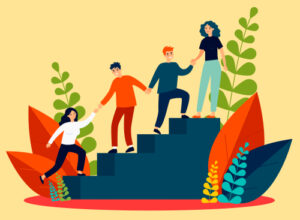May is Mental Health Awareness Month, so the next installment of our “Conversations” series is all about mindfulness. At a recent Noonovate, we had the pleasure of hearing from Rochelle Williams, Executive Director of the South Carolina Governor’s School for the Arts and Humanities Foundation.
As a first-generation American who moved around with her military family, Rochelle started searching for stability at a young age—she even established her own bedtime at seven years old. She also learned how to integrate quickly with people from different backgrounds and cultures. She credits those two things with preparing her to venture into mindfulness.
Rochelle’s journey with mindfulness began while working at a crisis center. When Rochelle asked a volunteer how she always remained calm, she shared with Rochelle that she practiced meditation, which inspired Rochelle to learn more and practice mindfulness on her own.
WHAT IS MINDFULNESS?
Rochelle explained that her definition of mindfulness is paying attention to paying attention. For her, mindfulness at its most basic level is turning attention outward to our surroundings and then inward to ourselves, concentrating on our breathing and how we are feeling physically and emotionally. Like exercising a muscle, mindfulness takes practice. We are constantly connected and engaging with several stimuli at any given moment. Research shows that the average person has more than 6,000 thoughts per day. Rochelle shared that when an individual begins practicing mindfulness, they may realize that many of those thoughts are repeated daily. Mindfulness, in turn, helps to identify and break thought patterns that are not helpful. As Rochelle put it, “When I identify with awareness itself, a quality of release and openness sets in that isn’t based on the world conforming to my preferences.”
MINDFULNESS AS A SUPERPOWER
Beyond unplugging from the distractions available to us, mindfulness has many other benefits—Rochelle even calls it her superpower. Some of the benefits include:
- Reduced stress, anxiety, and depression
- Increased focus
- Higher relationship satisfaction
- Improved working memory
- And more
Mindfulness also helps us become less reactive. Rochelle explained mindfulness helps us build the muscle of paying attention so we can deconstruct what’s happening and how it’s affecting us. To expand on that idea, she shared a quote from Viktor Frankl, a psychiatrist and Holocaust survivor who said, “Between stimulus and response, there is a space. In that space is our power to choose our response. In our response lies our growth and our freedom.” Mindfulness frees us to introduce an executive function to our thoughts and feelings so we can more wisely choose how to respond to a stimulus or trigger—which can also help us better communicate and collaborate with others.
PRACTICING MINDFULNESS ON YOUR OWN
Mindfulness is available to everyone—from taking a few minutes to do a breathing exercise, to devoting time in your morning routine for meditation. One of the most important elements of mindfulness is being present. You don’t have to start with an hour-long solo meditation—you can ease into it and fit it into your day in whatever way works best. There are several apps and online resources available to help you get started, including free guided meditations on YouTube.
We enjoyed our time with Rochelle and learning about the many ways mindfulness can improve our mental health and relationships.



